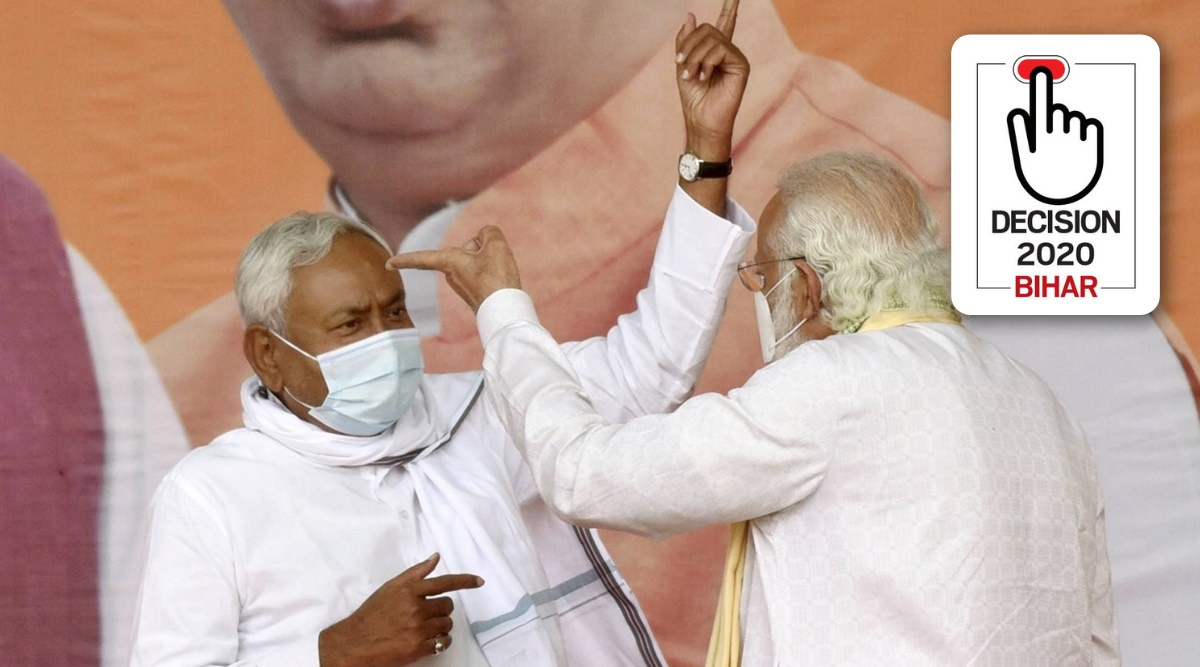 Prime Minister Narendra Modi (R) with Bihar CM Nitish Kumar during an election rally in Bihar on Friday. (PTI)
Prime Minister Narendra Modi (R) with Bihar CM Nitish Kumar during an election rally in Bihar on Friday. (PTI)To be poor in a world that has become enormously prosperous since World War II is a misfortune. To be poor in a poor country is the failure of democracy. To be poor in a poor state of a poor country is the curse of politics.
The average citizen of Bihar has become a victim of misfortune, the failure of democracy and the curse of politics. She has another chance to a better future as the state goes to elections this month. She has choices offered by the NDA (JDU, BJP and HAM), the Mahagathbandhan [RJD, Congress, CPI, CPI(M) and CPI(ML)], the LJP (Paswan) and another coalition of small parties.
Bihar’s Poverty
How poor is Bihar? Look at a few metrics. India’s net per capita income at current prices was Rs 1,34,226 in 2019-20, Bihar’s was Rs 46,664 — that is about than one-third of the all-India number — and the lowest among all states. With an average monthly income of Rs 3,888, the average Bihari does not get enough food or clothing or decent shelter. (Given the extreme inequality in India, a large proportion of Biharis will have an income below the average.)
The farmers’ plight is worse. Bihar allocated 3.5 per cent of its expenditure to agriculture against the average of 7.1 per cent for all states, the lowest in the country. 42.5 per cent of farmer households are indebted; that number goes up to 86.7 per cent for marginal farmers. The state’s APMC Act has been repealed and Bihar has opted out of the crop insurance scheme (PMFBY).
The unemployment rate since February 2019 (pre-Covid) has been over 10 per cent; among youth it is 55 per cent. Of the employed, 87 per cent do not have regular, salaried jobs. Of the 2 crore households registered under MGNREGA, only 36.5 per cent were given work.
A Legacy Betrayed
At Independence, the state had a robust administrative structure, upright and progressive leaders and a steel frame of civil servants. The Ganga flows through Bihar making South Bihar one of the most fertile regions of the country. Bihar’s signal achievement was early land reforms, abolition of the zamindari system, and distribution of land to the landless (rivaled only by Jammu & Kashmir). The missionaries had sowed the seeds of good education. It had, above all, a very hard working and resilient work force. (Even today, the migrant male Bihari worker is the most sought after construction worker and human harvester).
All that has changed dramatically in the last 30 years, 15 of them under Mr Nitish Kumar (with a self-inflicted break of 278 days). At the root of all the ills is abysmal governance. Between 2011-12 and 2018-19, Bihar’s GDP grew at an average rate of 6.6 per cent compared to the All India average of 7.73 per cent. Between 2005 and 2019, its public debt increased from Rs 43,183 crore to
Rs 161,980 crore. According to a CAG report, nearly 85 per cent of new borrowing goes towards payment of interest and principal. With little own resources, little borrowed money and an administrative structure in a shambles, there is low capital expenditure and few new, regular jobs.
The result is growing poverty. According to findings endorsed by the Niti Aayog, the poverty ratio of the state has increased to 55 per cent (2018-19). So, what does the poor Bihari do? He migrates, often with his family. None would have forgotten the human tragedy of lakhs of workers trekking hundreds of kilometers to return to their home towns/villages in Bihar and Uttar Pradesh (thanks to the sudden total lockdown on March 24, 2020) to escape homelessness and hunger. The anguished cry was “if we have to die, let us die among our kith and kin.”
Voting Out Incompetence
It is pretty clear that the people of Bihar will vote either for or against Mr Nitish Kumar. Mr Kumar was a product of the JP movement and a socialist to boot. It was believed he was thoroughly secular and would fight the rise of Mr Narendra Modi. When he first became chief minister, he seemed to have restored law and order and to be genuinely committed to development.
All that changed in July 2017 when he gave up his opposition to Mr Modi, broke the coalition government with RJD, joined hands with BJP and continued as chief minister, this time as the head of a NDA government. Since then, he has identified himself less with the people of Bihar and more with Mr Modi in order to sustain himself in office. That would be pardonable if he had lifted Bihar a few rungs higher on the economic ladder. On the contrary, the state has slided.
Mr Kumar cannot boast of even good law and order. The number of cognizable offences has risen by 157 per cent between 2005 and 2019. On average, 51 crimes against women, 18 crimes against dalits and 4 cases of rape are reported every day.
Grinding poverty and growing crime have rendered mute the people of Bihar. They must unmute themselves and vote out the incumbent government and give the reins to another party or coalition, with the threat of voting out that government too if it failed to provide decent and competent governance. The threat of ‘voting out’ is the real power of the electorate. The time to begin is 2020.